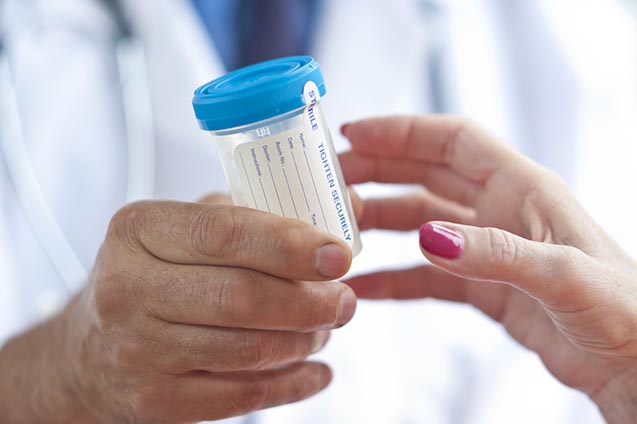Urinary tract infections, or UTIs, are caused when bacteria enter and infect any part of the urinary tract. The urinary tract includes the kidneys, ureters, bladder and urethra.
The most common type of UTI is a bladder infection. UTIs often require antibiotic treatment.
People of all ages and genders can get UTIs, although women are at a higher risk. Children can get UTIs, particularly those born with urinary tract abnormalities.
Causes of a urinary tract infection

A urinary tract infection is caused when bacteria enter the urinary tract via the urethra. As the bacteria start to multiple in the bladder, infection ensues.
While the urinary system is intended to force these invaders out, it is not successful every time. When it fails, bacteria can take hold, resulting in an infection of the urinary tract.
- Cystitis (infection of the bladder):
Typically caused by E. coli, (a bacteria that’s commonly found in the gastrointestinal tract), this type of UTI can also be caused by sexual intercourse.
- Urethritis (infection of the urethra):
When GI bacteria are spread from the anus to the urethra, this type of infection can occur. Sexually transmitted infections, such as herpes, gonorrhea, chlamydia and mycoplasma can also cause urethritis.
Urinary tract infection symptoms

If you are experiencing a urinary tract infection, you will likely feel a burning sensation when you urinate. An intense urge to urinate is also common, although often very little urine comes out.
You may also experience:
- Pain or pressure in your back or lower abdomen
- Cloudy, strange-smelling urine
- Fatigue, fever or chills
There are three types of urinary tract infections: infection of the kidney, bladder and urethra.
Those who suffer from an infection of the kidney are likely to experience:
- Upper back and side pain
- High fever
- Shaking and chills
- Nausea
Someone suffering from an infection of the bladder may experience:
- Pelvic pressure
- Discomfort in the lower abdomen
- Painful urination
- Blood in their urine
- Discharge and burning with urination
It’s important you seek medical attention as soon as possible if you believe you’re suffering from a urinary tract infection. A provider will need to take a urine sample from you to test it for the presence of bacteria.
Urinary tract infection treatment

Once a provider has properly diagnosed you with a urinary tract infection, he or she will give you an antibiotic to kill the bacteria.
It’s important that you complete the prescribed cycle of medication to ensure you kill the bacteria completely.
Tips for healing:
- You should also stay extremely hydrated, drinking lots of water, to help flush all the bacteria from your system.
- In some cases, your provider may recommend or prescribe medication to ease the pain.
- Heating pads can also help to alleviate pain.
What puts you at risk of a urinary tract infection?

We’ve already discussed that UTIs are more common in women, but there are certain risk factors that may put you at higher risk of suffering from a urinary tract infection.
The facts:
- Women who are sexually active are at a higher risk of a UTI than women who aren’t active.
- A new sexual partner increases that risk. Specific types of birth control, such as diaphragms, as well as spermicidal agents put women at a higher risk as well.
- Finally, after menopause women are more vulnerable to infection due to a decline in circulating estrogen.
Preventing a urinary tract infection

Unfortunately, about 1 in 5 women are likely to experience a second urinary tract infection.
If you’ve already suffered from one UTI, it’s important that you take precaution to prevent getting another urinary tract infection.
To avoid a second UTI:
- Whenever you feel the need to urinate, empty your bladder immediately. Make sure you empty it completely.
- Wipe from front to back.
- Stay hydrated and drink plenty of water.
- Take showers instead of baths whenever possible.
- Try to avoid feminine hygiene sprays, scented douches and scented bath products that will increase your risk of irritation.
- Clean your genital area before having sex.
- After having sex, urinate to flush away bacteria that may have entered the urethra.
- Wear cotton underwear whenever you can and keep clothing loose. Tight jeans and nylon underwear can trap moisture and create an environment that breeds bacteria.
- If you use a diaphragm, unlubricated condoms or spermicidal jelly for birth control, you should switch to another method. These can increase the growth of bacteria and cause irritation, increasing your chance of getting a UTI.
- While studies cannot prove that drinking cranberry juice prevents UTIs, it is likely not harmful.
Possible complications from a urinary tract infection
It’s important urinary tract infections are treated promptly as they can lead to complications when left untreated.
Women who’ve experienced two or more UTIs within a six-month period are likely to suffer from recurrent infections.
You should know:
- When left untreated, a urinary tract infection can also result in permanent kidney damage from an acute or chronic kidney infection.
- Pregnant women with an untreated UTI can lead to low birth weight or premature infants.
- Men who suffer from recurrent urethritis are at risk of urethral narrowing. A potentially life-threatening complication of an infection, sepsis, is possible if the infection works its way up the urinary tract to the kidneys.
UTI testing at CareNow® Urgent Care

If you believe you are suffering from a urinary tract infection, consider visiting your local CareNow®.
Because urinary tract infections aren’t something most people like to announce to others, we make testing easy, efficient and discreet.
At CareNow®, we can get you in and out, giving you your results quickly and without the hassle of a provider’s office visit.
Visit us for fast diagnosis and treatment

To find the nearest CareNow® facility near you, search below! Our experienced practitioners provide a full range of primary and urgent care services.
Be sure to check in online to wait from home before your visit!
Disclaimer: Patient’s health can vary. While this content was approved for publishing by a board certified medical director, always consult with your personal medical professional first before deciding that any medical advice from the internet is right for you.
